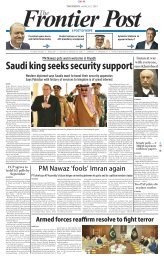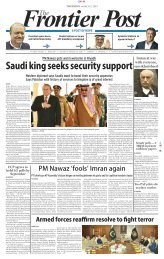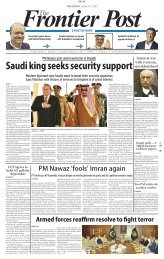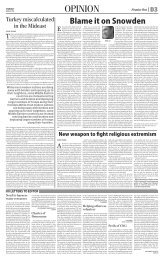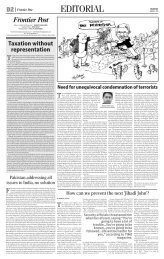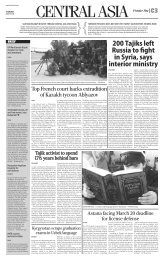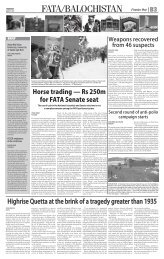Create successful ePaper yourself
Turn your PDF publications into a flip-book with our unique Google optimized e-Paper software.
CMYK<br />
B4<br />
<strong>AFGHANISTAN</strong><br />
THURSDAY<br />
MARCH 5, 2015<br />
BRIEF<br />
Talks underway with<br />
Chinese officials on<br />
Wakhan corridor: Ghani<br />
KABUL<br />
121 insurgents killed in<br />
fresh clearance operations<br />
KABUL<br />
Qaisar-Laman<br />
highway<br />
contractor<br />
asks for more<br />
President Ashraf Ghani met a delegation<br />
of tribal elders from<br />
northeastern Badakhshan<br />
province on Monday evening, a<br />
statement issue by presidential<br />
palace said. The members of delegation<br />
discussed the issues of security,<br />
unemployment, revival of<br />
Silk Road, construction of Kokcha<br />
hydro-power reservoir, illegal extraction<br />
of mines by mafia groups,<br />
and representation for<br />
Badakhshan in the national unity<br />
government, the statement added.<br />
During the meeting, President<br />
Ghani said the talks are underway<br />
with the Chinese government officials<br />
on revival of Wakhan corridor.<br />
He said the government is<br />
working to link Central Asia with<br />
China through railroad that connects<br />
Wakhan with eastern Herat<br />
province. Underling the importance<br />
of water management, President<br />
Ghani said that a committee<br />
has been assigned to assess<br />
Kokcha hydro-power reservoir.<br />
On Badakhshan’s azure mines,<br />
President Ghani said the government<br />
for the first time has been<br />
able to collect taxes from mine extractors.<br />
On the issue of security<br />
in Badakhshan, the President<br />
Ghani said China and Tajikistan<br />
have pledged to cooperate with<br />
Afghanistan in protecting borders<br />
of Badakhshan province. President<br />
Ghani, according to the<br />
statement, said all measures<br />
would be taken to ensure the<br />
educated and skilled people<br />
from Badkhshan are considered<br />
for work in various government<br />
offices. —FP Monitoring<br />
Operation to rescue<br />
hostages underway<br />
ZABUL<br />
The military operation that began<br />
on Monday night in Khak-i-<br />
Afghan District of southern Zabul<br />
province for releasing the 30 abducted<br />
passengers is still ongoing.<br />
Mohammad Sarwar Danish,<br />
2nd vice president of Afghanistan<br />
says that over 100 members of<br />
the group that is responsible for<br />
kidnapping the 30 passengers<br />
have been killed in the operation<br />
so far. According to him, Mullah<br />
Himat Manan had led the terrorist<br />
operation of kidnapping the<br />
30 passengers in Shah Joy District<br />
of Zabul province is among<br />
the ones killed. Danish has written<br />
on his facebook page that<br />
Mullah Himat Manan has killed<br />
himself through blasting his<br />
own explosives. As per the<br />
Afghan culture, local elders tried<br />
to negotiate the release with the<br />
abductors but it did not give<br />
any result. —FP Monitoring<br />
KABUL<br />
121 insurgents have been killed in<br />
fresh clearance operations across the<br />
country. A statement issued by the<br />
Ministry of Interior on Wednesday<br />
states that the operations were conducted<br />
in past 24 hours. According to<br />
the statement 23 foreign fighters were<br />
among those killed.<br />
The statement further states that<br />
nine insurgents were also wounded in<br />
the operations carried out separately in<br />
Nangarhar, Takhar, Kunduz, Sar-i-<br />
Pul, Kandahar, Zabul, Uruzgan, Ghazni,<br />
Herat, Ferah and Helmand provinces.<br />
A number of different types of Improvised<br />
Explosive Devices (IEDs) were<br />
also discovered and defused by the security<br />
forces during the operations, the<br />
statement adds. Among the ongoing operations<br />
one is Operation Zulfiqar in<br />
Helmand province in which hundreds<br />
of soldiers are taking part. The operation<br />
begun in Sangin District but later expanded<br />
to other adjourning areas.<br />
The operation is the largest operation<br />
being conducted independently by Afghan<br />
National Security Forces after taking the<br />
Afghan airstrike<br />
kills 21 Taliban<br />
miscreants<br />
KUNDUZ<br />
An Afghan airstrike in Kunduz province<br />
has reportedly killed 21 Taliban insurgents<br />
on Tuesday, local officials have<br />
confirmed Wednesday.<br />
The incident took place in Imam Sahib<br />
district of Kunduz province, where the<br />
Afghan Air Force bombarded Taza Quli<br />
village, said District Governor Imamuddin<br />
Quraishi.<br />
According to Quraishi there were no<br />
civilian and Afghan forces causalities<br />
in the operations. It was reported<br />
that the terrorists had established<br />
their haven at there for carrying out<br />
their activities. The Taliban insurgents<br />
have not yet commented about the operation.<br />
—FP Monitoring<br />
KABUL<br />
After the 9/11 the US and NATO intervened in<br />
Afghanistan, toppled down the Taliban regime<br />
and established interim government which<br />
paved the way for democracy, economic and social development<br />
in the country. United States and NATO<br />
hugely invested in various sectors in Afghanistan. Yet<br />
after 13 years of their involvement and billions of dollars<br />
investment the image of Afghanistan has improved<br />
little among those living outside Afghanistan. Many<br />
people outside Afghanistan still believes that the<br />
Afghanistan’s economy lay in ruins, large parts of the<br />
country are still under the control of Taliban and the<br />
full responsibility of the security from<br />
NATO forces at the start of this year. At<br />
the end of the year 2014 NATO winded<br />
Has Afghanistan achieved in 13 years?<br />
country is still an orphaned conflict. It is precisely because<br />
of the imbalanced news reported by international<br />
media from Afghanistan. Such kind of one sided news<br />
not only questions the US-NATO mission in<br />
Afghanistan but it also gives a harsh image of<br />
Afghanistan. While many people watching the news<br />
about Afghanistan, the typical questions they asks is:<br />
what has Afghanistan achieved in the past 13 years?<br />
Afghanistan in 2001 was almost bankrupt with<br />
most systems and infrastructure destroyed as result of<br />
civil war. The state institutions were either non-existent<br />
or nonfunctioning. Today, the Afghan economy<br />
is no more a black hole that is sucking in its neighbors,<br />
Afghanistan per capita GDP is at $688 which is five<br />
up its military role in Afghanistan and in<br />
2015 it started a Resolute Support mission<br />
which is aimed at training and assisting<br />
the Afghan National Security<br />
Forces to overcome the security challenges<br />
by themselves. —FP Monitoring<br />
Afghanistan officials sanctioned<br />
murder, torture and rape, says report<br />
KABUL<br />
Human Rights Watch accuses highranking<br />
officials of allowing extrajudicial<br />
killings and brutal practices to flourish<br />
after fall of Taliban<br />
Top Afghan officials have presided<br />
over murders, abduction, and other<br />
abuses with the tacit backing of their government<br />
and its western allies, Human<br />
Rights Watch says in a new report. A<br />
grim account of deaths, robbery, rapes<br />
and extrajudicial killings, Today We<br />
Shall All Die, details a culture of impunity<br />
that the rights group says flourished after<br />
the fall of the Taliban, driven by the<br />
desire for immediate control of security<br />
at almost any price.<br />
“The rise of abusive political and criminal<br />
networks was not inevitable,” the report<br />
said. “Short-term concerns for<br />
maintaining a bulwark against the Taliban<br />
have undermined aspirations for<br />
long-term good governance and respect<br />
for human rights in Afghanistan.”<br />
The report focuses on eight commanders<br />
and officials across Afghanistan, some<br />
ofthemcountedamongthecountry’smost<br />
powerful men, and key allies for foreign<br />
troops. Some are accused of personally inflicting<br />
violence, others of having responsibility<br />
for militias or government<br />
forces that committed the crimes. Kandahar’s<br />
most powerful commander, the<br />
former head of the intelligence service and<br />
a key northern governor are among those<br />
implicated. All of the accused have denied<br />
the allegations against them.<br />
Some have ties to the former president<br />
Hamid Karzai, who as early as 2002<br />
warned that security would be his first<br />
priority. “Justice [is] a luxury for now;<br />
we must not lose peace for that,” the report<br />
quotes him saying soon after coming<br />
to power. While he was in office, a<br />
blanket amnesty law for civil war-era<br />
crimes was passed. Afghanistan is one<br />
of the most corrupt countries in the<br />
world, according to Transparency International,<br />
and the compromised justice<br />
system also badly undermines accountability,<br />
with little sense among ordinary<br />
Afghans that abusers will ever be<br />
held to account. —FP Monitoring<br />
times what it was 13 years ago. Revenues increased<br />
from 3 percent of GDP in 2002 to a peak of 11.6 percent<br />
in 2011 and government tax revenues exceeded<br />
$1bn last year. Trade with Pakistan has increased from<br />
30 million dollars in year to 5 billion dollars per year.<br />
The growth in trade deals with Islamic Republic of Iran,<br />
including transit of goods and fuel products has<br />
reached to $4 billion per year. Afghanistan’s banking<br />
sector has grown drastically from two state owned commercial<br />
banks and four state owned special purpose development<br />
banks to nine privately owned commercial<br />
banks, three state owned commercial banks, and<br />
four foreign commercial banks with more than 400 total<br />
branches across Afghanistan. —FP Monitoring<br />
Deputy Minister of Public Works Ahmad<br />
Shah Wahid said on Monday that the<br />
second round of meetings between the<br />
Ministry of Public Works (MoPW) and<br />
the Turkish-American company ECCI<br />
over the contract for the planned Qaisar-Laman<br />
Road ended without an agreement.<br />
ECCI was reportedly only willing<br />
to commence the project if adequate security<br />
was provided for the company's<br />
personnel and sufficient fund from the<br />
Afghan government backing it.<br />
According to Mr. Wahid, ECCI has<br />
asked the Afghan government for more<br />
money to finish the incomplete highway<br />
project, but the amount is likely out of<br />
Kabul's range at a time when public debt<br />
is at an all-time high and foreign aid is<br />
growing more scarce. "It is very difficult<br />
for the government and Ministry of<br />
Public Works to pay the amount that<br />
they have been asked for," he said.<br />
In addition, Mr. Wahid expressed<br />
concerns over reports of the withdraw<br />
of public protection forces from<br />
Badghis who were assigned the task of<br />
providing security for the highway<br />
construction. Insecurity around the<br />
project sites was the initial factor that<br />
derailed ECCI's work in 2014.<br />
Local officials in Badghis have also<br />
voiced anxiety about the possible withdraw<br />
of public protection force assigned<br />
for security on the Laman-Qaisar highway.<br />
"We created this province after<br />
making heavy sacrifices, and I am very<br />
concerned about the issue, therefore, I<br />
informed the Ministry of Interior and<br />
sent them letters several times," Badghis<br />
Acting Governor Ahmadullah Alizai<br />
said. "But so far I haven't received a response<br />
from them."<br />
In response to the statement, the<br />
Ministry of Interior (MoI) has said<br />
that a final decision has not yet been<br />
made about the withdraw of forces<br />
from Badghis province. "So far we<br />
haven't made a decision, the letter<br />
which was sent by the Ministry of Public<br />
Works to the Department of Public<br />
Protection Forces was indicating the issues<br />
facing them," MoI spokesman<br />
Sediq Sediqi told.<br />
According to Deputy Minister of Public<br />
Works, Mr. Wahid, President Ghani<br />
originally gave a nine month deadline to<br />
complete the high project. Another<br />
meeting with ECCI has reportedly been<br />
scheduled in the coming weeks.<br />
Afghanistan has become one of the<br />
world’s orphaned conflicts. The world has<br />
turned away from Afghanistan, allowing<br />
civil war, ethnic fragmentation and polarization<br />
to become state failure. The<br />
country has ceased to exist as a viable<br />
state and when a state fails civil society<br />
is destroyed. Generations of children<br />
grow up rootless, without identity or reason<br />
to live except to fight. Adults are traumatized<br />
and brutalized, knowing only<br />
war and the power of the warlords. The<br />
entire Afghan population has been displaced,<br />
not once but many times over.<br />
The physical destruction of Kabul has<br />
turned it into the Dresden of the late<br />
twentieth century. —FP Monotoring<br />
C<br />
M<br />
Y<br />
K<br />
Building trust between police and people with community outreach programs<br />
To develop trust and understanding between<br />
Afghan National Police (ANP) and<br />
the communities in which they serve,<br />
Ministry of Interior Affairs (MoIA) has started<br />
sports tournaments and community outreach<br />
programs in 15 provinces across the country<br />
To facilitate better relations and greater cooperation<br />
between police and public, Afghan government<br />
has come up with many innovative initiatives.<br />
Besides enabling better police-public contact,<br />
these initiatives also seek to address the issue<br />
of rising crimes in society.<br />
The Ministry of Interior Affairs (MoIA) recently<br />
launched “Radio Police” program to enable<br />
smooth communication between police<br />
and public in Kabul and adjoining areas.<br />
Speaking at the launch ceremony, acting Minister<br />
for Interior Affairs, Ayoub Salangi said the<br />
main purpose of this program is to strengthen<br />
relations between police and public”. “The<br />
idea is to bring them closer so that they can together<br />
help in averting the incidents of violence<br />
and crime,” he said.<br />
Radio Police program comes after MoIA’s<br />
119 emergency helpline, which is already operational<br />
in six provinces across the country<br />
and has proved instrumental in thwarting<br />
small and big crimes. The 119 helpline was first<br />
started in 2009 in Kabul for public to receive<br />
and give information about emergency security<br />
issues. The 119 helpline was designed to<br />
facilitate better ties between police and public<br />
and break the iron curtain between them.<br />
The public awareness about this helpline,<br />
however, was not helping the cause. In October<br />
2014, Ariana TV and Awaz Production<br />
took it upon themselves to raise awareness<br />
about this program through as show called<br />
‘Show Reaction 119’. “The 119 helpline has<br />
proved immensely helpful in restoring our<br />
confidence and faith in security institutions,<br />
especially in the cases of emergency situations,”<br />
says Baseer Khan, a resident of Kabul.<br />
“Earlier, very few people knew about this program,<br />
but now a large percentage of people are<br />
aware of it and understand its importance.”<br />
Jalaluddin, a resident of Kabul, says it has built<br />
a bridge between police and public and helped<br />
in thwarting many sinister plots of terrorists and<br />
criminals. “It is our duty as responsible citizens<br />
to cooperate with police in combating crime and<br />
terrorism,” he says. Radio Police program comes<br />
after MoIA’s 119 emergency helpline, which is already<br />
operational in six provinces across the<br />
country and has proved instrumental in thwarting<br />
small and big crimes<br />
As part of the Afghan National Police Community<br />
Outreach Program, the Afghan government<br />
has also started sports competitions in at<br />
least 15 provinces to pave ground for closer and<br />
stronger ties between police and community.<br />
The primary goal is to develop trust and understanding<br />
between police and people in reporting<br />
criminal activities to their respective ANP<br />
headquarters and the 119 Emergency Services<br />
Call Center. Gen. Hikmat Shahi, a senior official<br />
in the Ministry of Interior Affairs, says the program<br />
has had a positive impact so far. The outreach<br />
program is conducted under the aegis of<br />
Sport Youth Development Organization (SYDP),<br />
which is funded by the U.S. Embassy in Kabul.<br />
The 15 provinces where this outreach program<br />
is underway include Kabul, Kandahar, Helmand,<br />
Paktiya, Wardak, Khost, Nangarhar,<br />
Laghman, Logar, Panjshir, Kunduz, Faryab,<br />
Ghazni, Herat, and Baghlan. The outreach program<br />
is being conducted in coordination with the<br />
Ministry of Interior Affairs and consists of<br />
sports tournaments and interactive sessions<br />
between Afghan police and members of the local<br />
community where they serve.<br />
“Afghan police has managed to foil many terror<br />
plots since this program has come into<br />
force, as it has allowed people to report directly<br />
to ANP headquarters through helpline number,”<br />
says Mr. Shahi.<br />
Zia Dashti, head of SYDP, says the chief aim of<br />
this program is to develop trust and understanding<br />
between Afghan Police and the communities<br />
in which they serve. “We have seen remarkable<br />
results over the past two years and this<br />
year we have expanded it further,” says Mr.<br />
Dashti. “It includes sports training and community<br />
outreach events, which can help people<br />
and police develop strong bond.”<br />
The primary goal is to develop trust and understanding<br />
between police and people in reporting<br />
criminal activities to their respective ANP<br />
headquarters and the 119 Emergency Services Call<br />
Center Sediq Sediqi, spokesperson in the Ministry<br />
of Interior affairs, says these programs are very<br />
effective in forging strong people-police ties.<br />
“We are planning to extend it to other provinces<br />
as well.” Farkhunda Arezo, who participated in<br />
a volleyball tournament organized by SYDP recently,<br />
says she is happy to have participated in<br />
it. “We are seeing the results, like one female participant<br />
from western Kabul called police a few<br />
days ago and informed about a case of theft in her<br />
neighborhood,” says Mr. Alimi. –FP Monitoring




